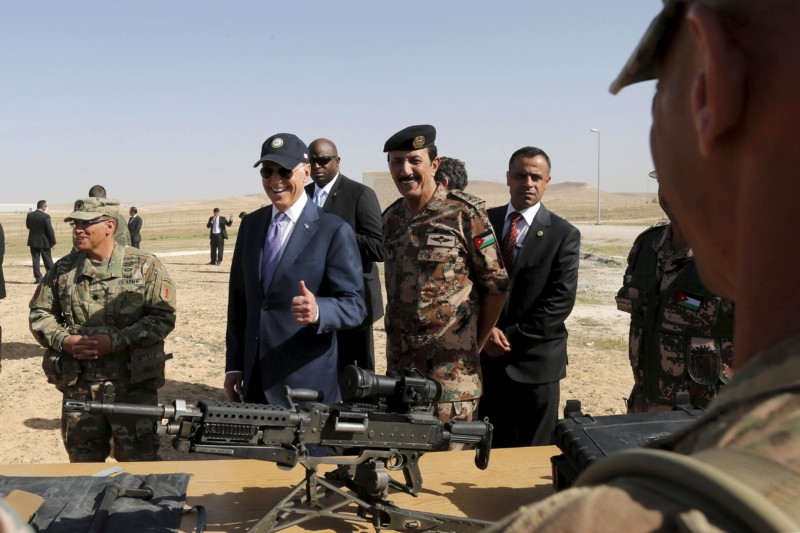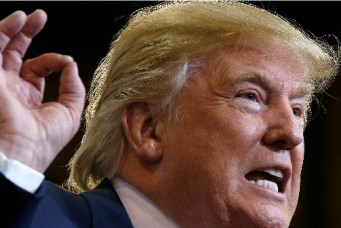What to Expect from Biden in the Middle East
A Biden administration is likely to rewrite a lot of Trump’s Middle East policies, but the Israel-Palestine issue may not be a priority.

Editor’s Note: This is the first in a series of articles about President-elect Biden’s Middle East policies.
Whenever a newly elected U.S. president is about to be inaugurated, we see a flurry of articles about new domestic and foreign policy initiatives that are under consideration. Some of these turn out to be obvious, some insightful, and some plain wrong. Remember that in 2000, George W. Bush had promised to conduct a “modest” foreign policy—but that was before the September 2001 attacks on the Twin Towers in New York and the subsequent American interventions in Afghanistan and Iraq.
Still, even if one cannot be sure that any set of predictions will stand up in the face of unforeseen events such as 9/11, we do have some indicators of what might change once President-elect Joe Biden settles into the White House. We can be pretty sure that he will try to undo some of outgoing President Donald Trump’s most controversial policies. We can also be sure that he will have to spend much of his time dealing with the fractured political system, the fragile economy, and the Covid-19 pandemic.
We do know, despite the immediate pressures to focus on domestic issues, that Biden has spent much of his long career as a senator and as vice-president with a strong interest in foreign policy. So, we should expect that he will devote some of his attention to these issues, and he has provided a number of clues about his priorities. We can look at his words and his initial choices for his foreign policy team to draw some preliminary conclusions.
Biden has said that the United States will focus on restoring good working relations with allies, especially in Europe; that it will rejoin the Paris Climate Accord and the World Health Organization; and that it will seek to rejoin the Joint Comprehensive Plan of Action (JCPOA) to try to restrain Iran’s nuclear program. Only the last of these steps will arouse much controversy in America and among certain countries in the Middle East that worry about any easing of pressure on Iran.
Obama Veterans
When we look at the key members of Biden’s foreign policy/national security team, we see mostly familiar names from the Obama period, especially those who worked closely with Biden when he was vice-president. His choice for secretary of state is Antony Blinken and his National Security Adviser will be Jake Sullivan. They both have close personal ties to Biden and are close friends. They fit the model of internationalists, with a focus on Europe and a propensity for preferring diplomacy to military force, but are also determined to reassert American leadership in world affairs. How these predispositions will play out in an era of American fatigue from numerous “endless wars”, especially in the Middle East, is impossible to predict with certainty. Suffice it to say that both of these key advisers seem to have concluded that the Middle East should not enjoy the centrality in American foreign policy that it did in the Obama era, and that relations with Europe, Russia and China will top the agenda for the new administration.
Biden has also selected as head of the CIA an experienced diplomat, William Burns—an unusual but widely welcomed choice. Burns is an experienced and respected diplomat, having served as ambassador to Jordan and Russia; he was assistant secretary of state for Near Eastern Affairs; and he was both undersecretary of state for political affairs and deputy secretary of state in the Obama era. For the position of Deputy Secretary of State Biden has named Wendy Sherman, one of the principal negotiators with Iran of the JCPOA. The only other name that may give us some hint of Biden’s thinking is the choice of Brett McGurk to head the Middle East office at the National Security Council. McGurk has worked in both Democratic and Republican administrations, most recently for Trump on issues involving Iraq and Syria and support for the Kurds in Syria as allies in the fight against ISIS/Daesh. Late last year, McGurk resigned when Trump called for the removal of all American troops from Syria. If his voice is heeded, we should not expect a sudden departure of American forces from Iraq, Syria and Afghanistan.
Biden himself has been stalwart in his support of the NATO alliance, his belief in the benefits of the free trade system and much of the post-World War II set of international institutions that sought to regulate international affairs. He did support the 2003 intervention in Iraq, but as vice-president he opposed Obama’s decision to send additional troops to Afghanistan, expressing doubts about the project of “nation building” there; he also reportedly opposed Obama’s decision to intervene in Libya in 2011. In recent years, he has expressed his concern about the blank-check policy that Trump seemed to follow with Saudi Arabia; and he has been critical of Trump’s attempt to court authoritarian leaders such as Russia’s Vladimir Putin and Turkey’s Recep Tayyip Erdogan, although he knows them both and will almost certainly try to reestablish a personal relationship with them. His views on China are not clear, although he has expressed skepticism about the heavy use of tariffs to try to pressure Beijing.
With this as background, here are my best guesses of what we can expect in the coming months as the Biden administration turns its attention to the Middle East.
Priority: Iran
The top priority issue will be to try to rejoin and revitalize the JCPOA, and so we should expect the appointment of an “Iran Czar” to lead the diplomacy of reengagement. The new team understands that the window for action may close early, since Iran is facing presidential elections of its own by mid-year. They understand that if Iran is to reverse course on its enrichment of uranium, there will have to be immediate relief from the harsh sanctions that the United States has imposed. Other issues such as Iran’s development of missiles, and its regional actions that alarm some of America’s friends and allies, will be dealt with in subsequent talks, but cannot be resolved prior to rejoining the JCPOA. The Biden team know that Saudi Arabia, the United Arab Emirates (UAE) and especially Israel will not be happy with this initiative, but they will not be deterred from trying. The alternative, they fear, would be a future risk of war with Iran, a race by other countries to acquire nuclear capabilities, and a continuation of instability in the region.
The Biden team is also determined to rebalance the relationship with Saudi Arabia, and, to a lesser extent, with the UAE and Israel. With Saudi Arabia and the UAE there will be serious talks about ending military operations in Yemen and trying to address the humanitarian disaster there. It is not clear if Biden will immediately reverse the Trump administration’s designation of the Houthis as a terrorist organization, but that is a possibility. In addition, some of the multi-billion-dollar arms sales promised to the UAE and Saudi Arabia may be reviewed and even frozen.
Israel is a different matter, in large part because of domestic politics and Biden’s own strong support for Israel over the years. Biden knows Netanyahu well, has disagreed with him in public on such matters as settlement activity in the West Bank, but seems to believe that he can use his personal relationship to moderate Netanyahu’s more extreme tendencies. This suggests that he will not reverse the decision to move the U.S. embassy from Tel Aviv to Jerusalem or to recognize Israel’s annexation of the Golan Heights, but he will make clear that the Trump-Kushner so-called peace plan will not be his point of departure.
This leaves relations with Turkey as a third priority of the Biden team. It is not clear who will take the lead on this, since McGurk is not welcome in Ankara. And although Biden has on occasions been critical of Erdogan, he certainly understands that Turkey plays an important role, both as a member of NATO and a regional power with influence in Syria and beyond. This might be a case where Biden gets directly involved in trying to smooth the relationship with Turkey, or he might task his secretary of state or a special envoy with the job.
When it comes to the Israel-Palestine issue, which has preoccupied US presidents since at least the late 1960s, it cannot be ignored but will not be a top priority for Biden in present circumstances. At most, we might expect an early end to the boycott of the Palestinian Authority (PA), and renewed support for United Nation Relief and Works Agency (UNRWA) funding for Palestinian refugees. In addition, some form of diplomatic contacts will be restored between the US and the PA, but the details have not yet been worked out. The knee-jerk reaction will be to try to build support for the so-called two state solution, although very few people actually believe it has a chance of being accepted by the key parties in present circumstances.
Sudden Shifts
The above list leaves many other important issues and relationships unaddressed. This does not mean that relations with countries such as Egypt and Jordan will be unimportant; nor will American diplomats cease to focus on developments in Iraq, Syria, Lebanon and Libya. For example, the Maghreb will receive a modest amount of attention. But none of these issues will be at the top of Biden’s agenda when he takes office on January 20, 2021. In terms of an overall view of the region, the Biden team wants to devote less time and attention to the Middle East; it is no longer going to play the misguided game of trying to topple regimes to make way for emerging democracies. It may continue to talk about human rights, but in a softer voice than in the past, and it will be more inclined to address regional issues in cooperation with other actors—sometimes the Europeans, sometimes strong players in the region, sometimes with Russia, and, who knows, even with China in the future.
Several developments could alter these projections, perhaps even quite suddenly. If the effort to rejoin the JCPOA fails, that could revive a call for more pressure on Iran through even tougher sanctions. If the peace talks in Afghanistan fail, that might also slow down the plans for disengaging militarily from the region. And, if ISIS/Daesh or al-Qaida were to make a comeback somewhere in the region, this also might force a reassessment of how to deal with a clear threat to regional and international stability. But the Biden team is hoping to avoid these distractions and focus instead on domestic issues—the top priority—and the need for a new policy to deal with China’s growing power and influence. Maintaining a stable nuclear balance with Russia is also a must.
In conclusion, there is one other factor that could change the priorities of the Biden team: in the Middle East today, there are a number of leaders who have been in power for a long time, and almost certainly there will be some changes in coming years. Some of these changes may not have much impact on foreign affairs, but one can never be sure. Remember what happened when Egypt’s Gamal Abd al-Nasser died in September 1970 and was succeeded by Anwar Sadat. Within a relatively short period of time, Egypt’s foreign policy orientation had shifted, the 1973 war had been fought, and a turn toward US-led peace diplomacy was underway.
Similarly, when the Shah of Iran was forced out of his country at the end of 1978 and replaced by Ayatollah Khomeini, Iran’s foreign policy changed abruptly, with huge consequences for the region and for the United States. In today’s Middle East we see leaders such as President of the Palestinian Authority Mahmoud Abbas who has been in power since 2005; Bashar al-Asad who has ruled Syria since his father’s death in 2000; Erdogan who has been in power in Turkey since 2003; and Ali Khamenei who has been Supreme Leader in Iran since 1989. King Salman of Saudi Arabia is 85 years old and his passing could reopen the question of succession. Israel’s Netanyahu, in power since 2009, might also be reaching the end of his ability to hold his fractious Likud party together.
In short, within a relatively short period, the Biden administration could be faced with new issues, new leaders, and new dilemmas in the Middle East. Every administration in recent memory has tried to establish its own preferred approach to this complex region. And each has had to make mid-course adjustments, as events in the region force reassessments of what is important and what is possible. At a minimum, it is reassuring to know that Biden starts with a relatively realistic and modest agenda, informed by the failure of the past three presidents, and with a team of advisers who are generally competent and informed. That is no guarantee of good or effective policies, but it is a relief after four years of incompetence and recklessness.
William B. Quandt is Edward R. Stettinius Professor of Politics at the University of Virginia. He has taught at the University of California, Los Angeles, the Massachusetts Institute of Technology, and the University of Pennsylvania and was a senior fellow at the Brookings Institution. During the Nixon and Carter administrations, he served on the National Security Council; he played an active role in the negotiations that led to the Camp David accords and the Egyptian–Israeli peace treaty. He is the author of numerous books, including Peace Process: American Diplomacy and the Arab–Israeli Conflict since 1967, and Camp David: Peacemaking and Politics. Quandt was a member of the Board of Trustees of the American University in Cairo from 1992 until 2017.
Read More



